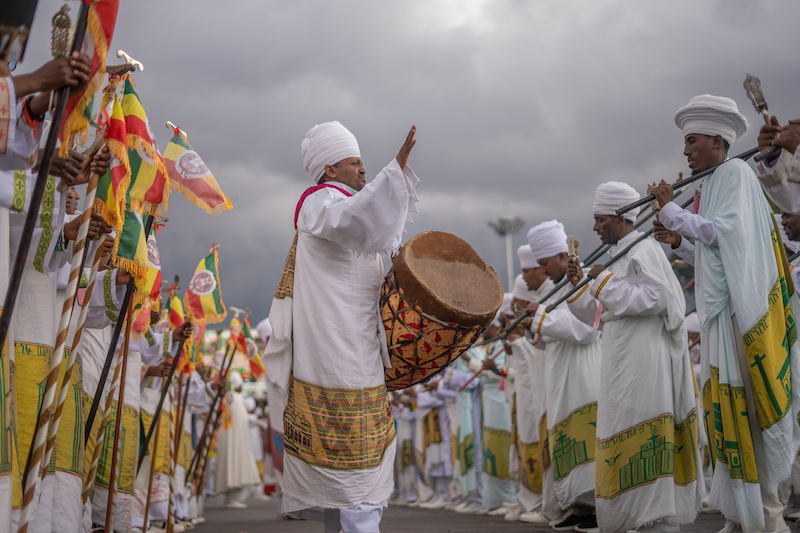“Enkutatash the “gift of jewels”
The change of seasons, the legend of the Queen of Sheba, the Bible, Christian spirituality, the ancient Coptic calendar and the blooming of the golden Meskel flowers are all associated with the celebration of the Ethiopian New Year on Meskerem 1 (September 11 GC).
As the rains tail off in September and warm, sunny days return, new beginnings are embraced, marked with a religious and public holiday. Early in the morning, young girls can be heard singing ‘abebayehosh’ and children, clad in brand-new clothes, dance through the villages giving bouquets of Meskel flowers and painted Enkutatash pictures to each household. Throughout the day, family and friends visit each other and reconnect over a joyous, festive meal of Doro Wot. Guests arrive with gifts and bunches of Meskel flowers that carpet the countryside at this time of year.
September is also significant for orthodox Christians because according to the Bible, God created Heaven and Earth in September. Early Christians, who used a solar calendar, also found spiritual significance in the number of daylight and nighttime hours being equal in September.
Even the legend of the Queen of Sheba is connected with September, this traditionally being the month when she returned from visiting King Solomon with gifts of many precious jewels. She was greeted by the sight of the Meskel flowers beginning to bloom on the hillsides, signifying the start of new life within the country.
In honour of their former empress, the festival was named ‘Enkutatash’, meaning the ‘gift of the jewels’, a name it still bears to this day.
MESKEL – THE FINDING OF THE TRUE CROSS
“A festival showcasing Ethiopia’s rich culture, spiritually and traditionally”
This unique festival marks the finding of the cross upon which Jesus was crucified, by Queen Eleni (Helena), mother of Emperor Constantine, in the early fourth century.
According to legend, Queen Eleni had a revelation in a dream. She was told that she should make a bonfire and that the smoke would show her where the True Cross was buried. To resemble the burning fir tree whose smoke guided her to the True Cross, demera (bonfires) are set up on 27 September all over the country. Many from the cities return to their villages for this celebration. In Addis Ababa, a colourful ceremony, led by priests chanting and swaying in time with the beat of their sistrums and drums, takes place in Meskel Square. Bishops, civic leaders and VIPs assemble for speeches. Deacons and followers from churches all over the city descend on Meskel Square to dance and sing in front of the demera. Horses add to the spectacle. Lions were part of the Meskel procession back in the days of Emperor Haile Selassie I.
As the sun sets, the demera is set alight. The crowd wait expectantly, hoping the demera will fall in the auspicious direction. As the crowd disperses, many rush to pick up a holy ember to mark themselves with a cross, symbolizing their devotion to God.
Considered a hugely important public holiday in Ethiopia, Meskel is now on the Representative List of the Intangible Cultural Heritage of Humanity by the UN Agency for Education, Science and Culture (UNESCO).



